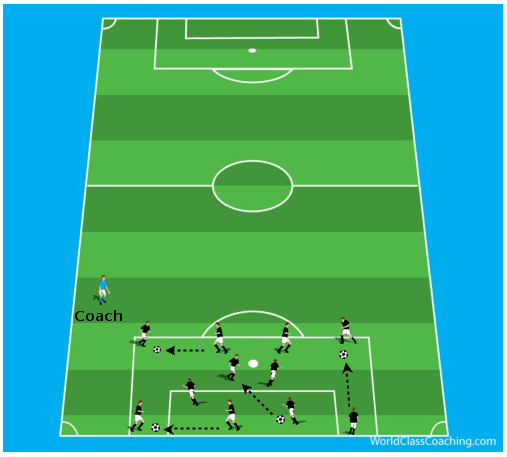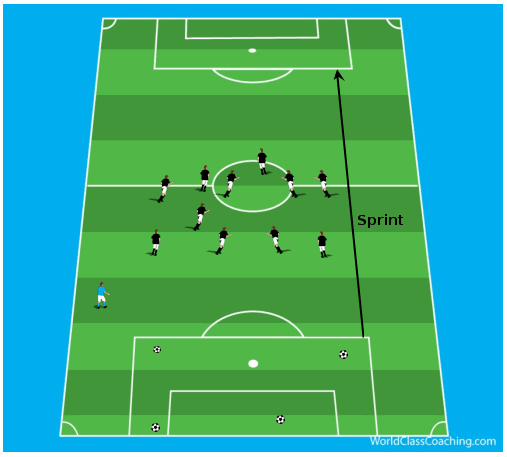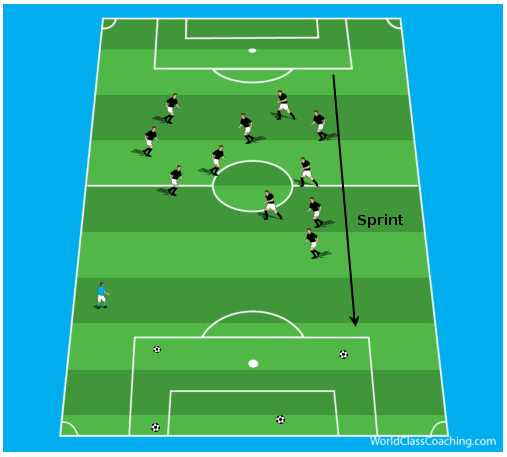By Justin Cresser
Welcome to the July-August issue of Coaching Soccer Conditioning’s Soccer Science; where we present the latest findings from Sports Science research in soccer, and discuss how these findings may influence the way we train we our players.
ARTICLE TITLE:
Today’s featured article is entitled: ‘Effect of Additional Speed-Endurance Training on Performance and Muscle Adaptations’. It was published in the May 2012 issue of Medicine and science in sports and exercise. The article can be accessed by clicking on the link below:
http://www.ncbi.nlm.nih.gov/pubmed/22617392
MAIN FINDINGS:
The aim of the study was to determine the effect of additional speed-endurance training during the competitive season (in-season) on soccer performance (assessed using sprint, agility and endurance tests). The study showed that players who took part in speed endurance training once per week, in addition to their regular scheduled training, led to a significant improvement in the ability to perform high-intensity exercise. The speed endurance training consisted of performing 6 to 9 repetitions of 30-second intervals at 90 to 95% of their maximum intensity.
APPLICATION TO TRAINING:
Soccer involves performing a number of labor-intensive actions (sprints, vertical jumps, shielding the ball from an opponent) over the course of a game. The ability to repeatedly perform these high-intensity actions is a key predictor of soccer performance, and there is a significant decrease in the amount of these actions performed in the second half and especially towards the end of the game. In fact, one of the major differences between top class and average professional soccer players is the amount of high-intensity runs they perform during a 90-minute game.
Incorporating high-intensity interval training (defined as speed-endurance training in this article) will improve your player’s work capacity and delays the onset of fatigue that we frequently see towards the end of a match. The following is a simple exercise that you can incorporate into your training once per week to improve the ability of your players to work at a high intensity.
SAMPLE ACTIVITY:
Pass and Move with full Field Sprints
This exercise uses a regulation-sized soccer field for the playing area. Have all you players stand inside one the 18-yard boxes. Give the entire group about 4 to 6 balls and instruct them to pass amongst themselves. After each pass, have them move into space (Figure 1).
After 60 seconds, direct them to sprint to the top of the 18-yard box at the other end of the field and back: a total of approximately 150 to 200 yards (Figures 2 and 3).
After they return to the 18-yard box where they started, have them walk around for 60 to 90 seconds and then instruct them to resume passing and moving into space for another 60 seconds. As before, instruct them to sprint to the top of the 18-yard box at the other end of the field and back.
Continue this pattern until the players have performed a total of 6 to 8 repetitions. However, consider varying the passing and moving component after every 1 or 2 reps. For example, you can have them dribble for 5 or 6 steps before making their pass, or you can change the type of pass made and they way the ball is received.
COACHING POINTS:
- Ensure your players make quality passes (accurate and firm) and then immediately move into space.
- Ensure they take their first touch into space and keep the ball moving until they are able to find a player to pass to.
- This is a high-intensity exercise, so encourage your players to complete the run at a pace that is 90 to 95% of their fastest time. The run should take no more than 35 to 40 seconds, depending on the age of the players.
- Encourage good running form and arm action as they sprint from box to box.
Justin Cresser – Has coached soccer at various levels both in North America and abroad (Hong Kong and Africa). His most recent position was as the Assistant Technical Director at the Soccer Club of Toronto. He has his National Diploma from the NSCAA and is also a certified strength and conditioning coach.





